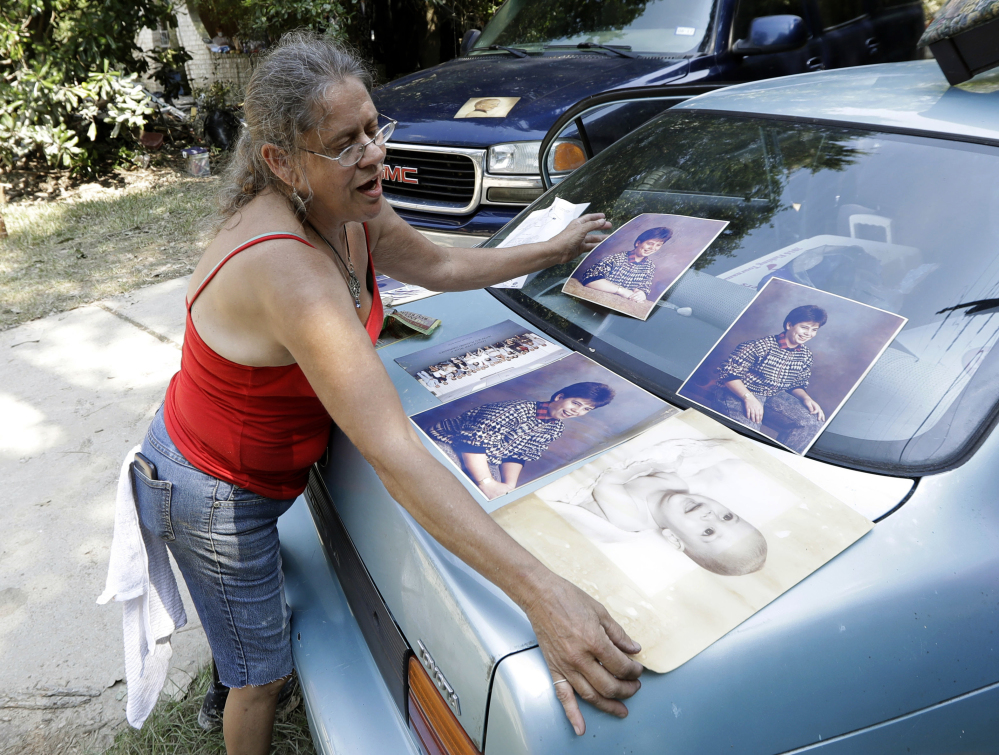HOUSTON — Crews went door-to-door Sunday in parts of western Houston, shutting off power and warning anyone still in homes left soggy by Harvey that more flooding was possible as engineers relieved pressure on overtaxed city reservoirs.
Some people took a break from their cleanup efforts in the sweltering heat to worship on a declared National Day of Prayer, while others worried about looters and scavengers in storm-ravaged neighborhoods.
Houston officials stressed that the recovery was already beginning despite the renewed flood threat, but an official in the town of Liberty, northeast of the city, said some people in outlying areas there had yet to even return to their homes.
“This will last for some people for months, if not years,” said Liberty Fire Chief Brian Hurst.
Authorities also warned that fires from a chemical plant rocked by previous blazes and explosions were still a possibility in the suburb of Crosby and residents of Beaumont remained without potable water.
At least 4,700 Houston dwellings were under new, mandatory evacuation orders, though about 300 people were thought to be refusing to leave. The Army Corps of Engineers said the water release is necessary to relieve the Addicks and Barker reservoirs from several feet of rain from Harvey and to create space in case of more.
Mayor Sylvester Turner said anyone staying in already-waterlogged homes were endangering themselves and first responders. Harvey hit Texas Aug. 25 as a Category 4 hurricane, but brought the worst flooding to Houston and other communities as a tropical storm. It is blamed for at least 44 deaths.
Still, Turner insisted that much of the nation’s fourth-largest city was hoping to get back on track by Tuesday.
“The city of Houston is open for business. Anyone who was planning on a conference or a convention or a sporting event or a concert coming to this city, you can still come,” Turner said on CBS’ “Face the Nation.”
But in the southwest Bellaire neighborhood, police received reports of scavengers picking through water-damaged possessions and urged those cleaning up to keep anything left outside to dry closer to their homes and separate from what was considered a total loss.
In the suburb of Dickinson, one homeowner used orange spray paint on a sheet of dirty plywood to warn: “Looters Will B Shot.”
Repairs continued on the water treatment plant in Beaumont, about 85 miles from Houston, which failed after the swollen Neches River inundated the main intake system and backup pumps halted.
In the nearby town of Vidor, Pat Lawrence and her fiancé, Jim Frasier, hopped on a tractor, the only way they could make it to services at the Pine Forest Baptist Church.
“You can’t hardly comprehend all the water that’s around,” Lawrence said. “My house is not flooded but getting out is flooded. I’ve been in my house since last Saturday, not left the place until today.”
Authorities continued to monitor Crosby’s Arkema plant where three trailers of highly unstable compounds ignited in recent days, sending thick black smoke and tall flames into the air. There were no active fires at the facility, Sunday, but six more trailers were being watched.
Floodwaters also have inundated at least five toxic waste Superfund sites near Houston and some may be damaged.
At St. Joseph Roman Catholic Church in the Gulf Coast city of Port Aransas, the clergy set out holy water and bug spray, and many anointed themselves with both.
“We will remember the destruction of this uninvited guest but we will never stop being a people of hospitality. The peace will return,” the Rev. Kris Bauta told about 50 worshippers from the darkened sanctuary. The church, only four blocks from the Gulf, suffered only a damaged carpet from a leak in the roof, although the storm surge ended three feet from the building.
Trump has asked Congress for a $7.9 billion down payment toward Harvey relief and recovery efforts – a request expected to be swiftly approved when lawmakers return to work Tuesday. Abbott called that a mere “down payment” and suggested the total cost of recovery could be as much as $180 billion.
Send questions/comments to the editors.



Comments are no longer available on this story